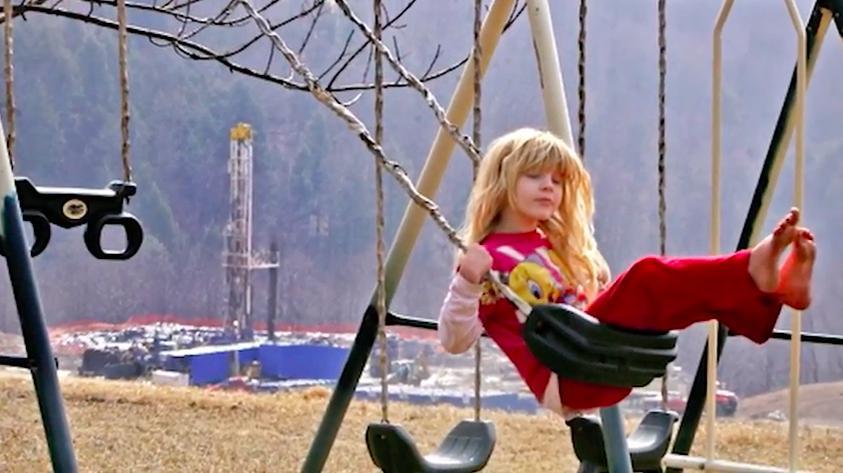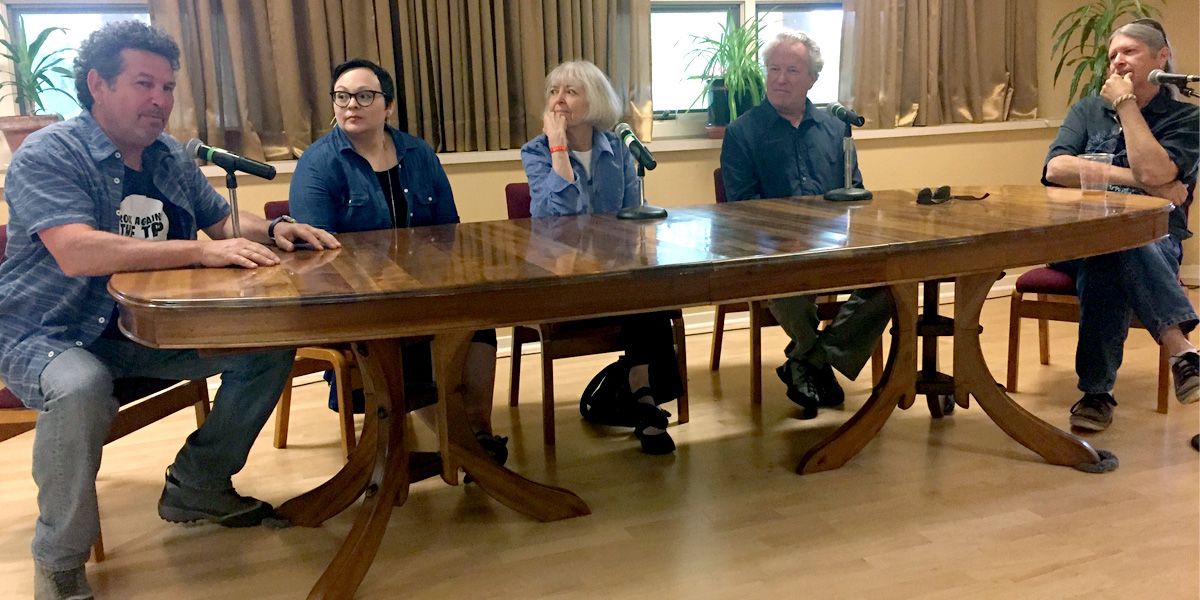
2 Colorado Anti-Fracking Initiatives Move to November Ballot
Local environmental groups collected at least 98,492 signatures for measures 75 and 78, which will allow voters to decide the fate of oil and gas operations in the Colorado.

Two anti-fracking measures are one step closer to appearing on Colorado’s Nov. 8 ballot. Local environmental groups have collected at least 98,492 signatures for measures 75 and 78, which will allow voters to decide the fate of oil and gas operations in the state. Now, the petitions only need to pass a validation review by the Secretary of State’s office to make it onto the ballot.
As EcoWatch reported, initiative 75 would amend the state constitution to enable local governments the option to enact regulations more protective of health and safety than those required by the state, largely addressing the Colorado Supreme Court’s recent decision to strike down local fracking bans approved by voters in the cities of Fort Collins and Longmont. Initiative 78 would create 2,500-foot buffer zones between homes, schools and sensitive areas like playgrounds and water sources, and all new oil and gas development.
Yes For Health and Safety, a coalition of groups pushing the two ballot initiatives, celebrated their achievement.
“I am thrilled that the people of Colorado will have their voices heard,” said Tricia Olson, the executive director of Health and Safety Over Fracking. “I am so so grateful to our hundreds and hundreds of Colorado volunteers and to the organizations that stepped forward.”
WE DID IT! Petitions are in and not even Goliath could stop us! pic.twitter.com/BZdTCJnpWu
— Yes4Health&Safety (@YesHealthSafety) August 8, 2016
“This is a good day for Colorado, and it’s a good day for democracy,” said Lauren Petrie, the Rocky Mountain Region director of Food & Water Watch. “These initiatives will give communities political tools to fend off the oil and gas industry’s effort to convert our neighborhoods to industrial sites. This is a significant moment in the national movement to stem the tide of fracking and natural gas.”
Colorado is the seventh-largest oil and gas producing state in the country. A study by the Colorado Oil and Gas Conservation Commission found that 90 percent of the state’s surface acreage would be unavailable for oil and gas development if the setback measure passes.
In its counter campaign, energy companies have funneled millions of dollars to Protect Colorado, an industry group that aims to defeat the two measures.
“Energy companies Anadarko Petroleum Corp and Noble Energy Inc in the past month each increased their contributions to the group by $2.5 million, bringing their total donations to $6.55 million and $5 million, respectively, according to the latest campaign finance filing,” Reuters writes.
Protect Colorado issued a statement in reaction to the successful signature campaign:
“We are confident that Coloradans will see these measures for what they are: a backdoor fracking ban that would be economically devastating for our state,” Karen Crummy, the group’s communications director, said.
“If passed, they would eliminate 90 percent of all new oil and natural gas development. This means more than 140,000 of our friends and neighbors will lose their jobs, and everyone in the state will surrender $217 billion in economic activity over the next 15 years. These initiatives would also allow the government to take private property, costing taxpayers billions of dollars in compensation costs. This is not the Colorado way and is out of step with the majority of Coloradans who support responsible oil and natural gas development.”
The group’s “Decline to Sign” campaign included a barrage of radio, television and print advertisements. Billboards were plastered in Fort Collins and Denver metro with phrases such as, “Think before you ink, it’s decline to sign.”
According to Yes For Health and Safety, “In the final weeks, men hired by front groups for as much as $25/hour took to the streets to harass and intimidate petitioners and to keep interested parties from signing petitions.”
The Colorado Independent alleges that Big Oil and Gas has gone beyond an “orchestrated, multi-year” operation in trying to sway public opinion on fracking—they have also tried to stack the political deck in their favor. The publication noted:
With $10 million dollars in “media reserve” in late 2014, CRED [Coloradans for Responsible Energy Development] ran ads in the U.S. Senate race between Mark Udall and Cory Gardner and mobilized industry foot soldiers to canvass when any new towns started signaling that they, too, might want to pass moratoria on drilling.
In 2015, the industry group made “a preemptive strike in Fort Collins,” which involved “making sure that the right city council members got elected to the city council to stop a potential fracking ban,” according to the transcript.
According to another piece by The Colorado Independent:
“As of Aug. 1, the industry had raked in $15 million in contributions to defeat the two initiatives, out-raising supporters of the campaigns by a ratio of 35-to-1.”
The Yes for Health and Safety Over Fracking coalition noted in a press release that its team members gathered signatures on a relatively small budget using mostly volunteer petitioners. Thanks to the ARISE Music Festival in Loveland, Colorado this past weekend, petitioners were able to connect with more Coloradans and get any last minute signatures still needed.
Olson was joined by Paul Bassis, co-founder of ARISE; Maria Orms of North Metro Neighbors for Safe Energy; Jon Bowermaster, director of Dear President Obama; and Joel Dyer, editor of the Boulder Weekly, at a press event at ARISE on Aug. 5 to discuss the two anti-fracking ballot initiatives.

“This is what a true grassroots campaign looks like,” Orms said. “It’s moms and dads, grandparents taking action to protect all that we hold dear. The oil and gas industry thought it could silence us by spending millions on advertising, but our state is not for sale.”
Orms is a resident of Thornton, an area that has seen increased oil and gas development. While she does not live immediately next to a fracking well, she detailed to The Colorado Independent how she and her daughter, a 17-year-old athlete, developed asthma despite never having prior related health problems. After receiving an asthma inhaler from a doctor, the doctor told her, “I’m handing these out right and left to everyone.”
In the ballot campaign video below from Yes for Health and Safety, the narrator describes how 90 percent of fracking happens next to schools, playgrounds and hospitals and that people living near these sites are becoming sick.
The Colorado Independent described how Orms believes that fracking operations might have exacerbated the diagnosis:
She remembered that the previous year, there had been an airplane “zigzagging back and forth over the neighborhood,” and figured out that it was an effort to take air quality measurements. Orms started looking for studies that might have come out of those flights, and learned that they had measured elevated concentrations of chemicals that can accelerate the creation of ground-level ozone, also known as smog. These chemicals, including volatile organic compounds, or VOCs, are a byproduct of the industrial processes involved in extracting natural gas. On hot summer days, which are getting hotter all the time as the planet warms, the presence of increased ground-level ozone can cause, among other things, what she and her daughter now had: asthma.
Study Links Fracking to Asthma Attacks – EcoWatch https://t.co/vZJ2uR3Xxy @Frack_Off @Peter_Seeger
— EcoWatch (@EcoWatch) July 20, 2016
Yes for Health and Safety is now planning for another round of campaigning to build support throughout the state once the petitions are confirmed by the state’s auditing process.
“Thousands of Weld County residents signed because they have first-hand experience of what it’s like to have toxic fracking wells in their backyards. Farmers signed. Oil workers signed. Republicans signed and Democrats signed,” Therese Gilbert of Weld Air and Water said. “This is a non-partisan issue because it is a health and safety issue. Our elected officials have not listened to our concerns, and more and more families across Colorado are now having to fight industrial fracking sites going in right next to their children’s schools. ”
The people of Colorado have spoken: protect communities from #fracking! Ballot initiative submitted! pic.twitter.com/hZDoOa8IKv
— Oil Change International (@PriceofOil) August 8, 2016
“The failure of the state to protect our health and safety has forced the people to take matters into their own hands,” said Jeanette Pidanick of North Metro Neighbors for Safe Energy.

 233k
233k  41k
41k  Subscribe
Subscribe 